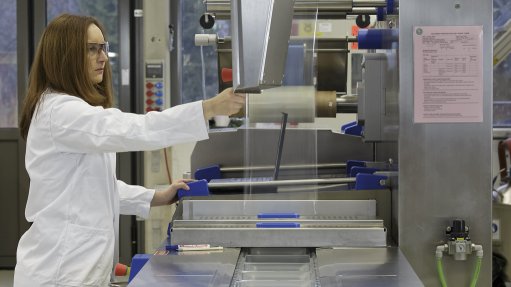
CONSISTENCY Dow aims to ensure that the quality of goods received by the end-customer is consistent
Executives from chemicals, materials, agrosciences and plastics company Dow reassured African clients that the company’s commitment to servicing the continent would remain and grow sustainably, as flexible plastic packaging could play an important role in spurring economic development and supporting the drive for a more sustainable world.
Dow has a manufacturing facility in New Germany, KwaZulu-Natal, which produces acrylic adhesives. All other products are produced in other countries and are imported into South Africa, from where they are distributed to various customers.
Dow claims that Africa, together with the Middle East, is the world’s fastest-growing region after Asia. In total, 45% of gross domestic product growth in Africa stems from sectors in direct contact with the consumer, thereby highlighting increasing consumer power and income. Africa is also urbanising rapidly, with 40% of its population currently living in cities. Consequently, food safety, shelf life and supply chain transportation assume greater importance, as food will have to travel greater distances to meet the demand of expanding urban populations.
Dow president Diego Donoso says demand for more sophisticated shopping and retail in Africa is increasing, with consumers with increasing disposable incomes subsequently demanding fresh food that is healthy and conveniently packaged.
To ensure it meets the growing demands of plastic products from Africa and other regions, Dow entered into a joint venture with petroleum and gas company Saudi Aramco in 2011 to construct the world’s largest integrated chemicals complex – Sadara, in Saudi Arabia – which was built in a single phase.
The Sadara project achieved the milestone of its first polyethylene production in December 2015, thereby meeting the previously announced targets to begin production by the end of 2015.
Investment in Sadara has been key to Dow’s targeted strategic growth actions over the past several years, with all 26 of Sadara’s manufacturing assets remaining on schedule for a sequenced start-up process, beginning with the polyolefins envelope, to increase timing in the ethylene cycle. This is followed by ethylene oxide/propylene oxide and their derivatives.
Enhancing Sustainability
In 2015, Dow announced a strategic set of commitments designed to redefine the role of business in society, to be achieved by 2025. This includes a commitment to advance the world’s transition to a circular economy, in which waste is converted into new products and services.
Dow Europe, Middle East and Africa sustainability director Dana Mosora says the circular economy will focus on reducing food waste, improving resource efficiency and increasing recyclability, as well as working with initiatives globally to address marine debris.
Therefore, flexible plastic packaging plays a key role in reducing food spoilage and waste. More environmental benefits can be gained by reducing food waste, compared with the already reduced impact of packaging waste.
Flexible plastic packaging can extend the shelf life of food from three days to more than 14 days in-store, with in-store waste reduced from an average 3% of stock to less than 1%.
“Flexible plastic packaging is often the most efficient when it comes to reducing food spoilage and waste, but, until now, it has also been more difficult to recycle,” says Mosora, adding that Dow is, therefore, working closely with all industry members to develop more sustainable and appropriate solutions.
Dow VP Javier Constante says a continuous presence and support for the South African plastic packaging industry are essential to remaining sustainable in the region. In this regard, he says Dow tries to work with the entire value chain of the plastics and packaging industry to determine all the customers’ needs. “This will allow Dow to adapt and create a product that will have the functionalities that are required in the market today.
“We need to ensure that the quality of goods received by the end-customer is the same as any other customer would receive elsewhere in the world.”
Further, Dow established a logistics hub in South Africa in 2015 to service the local market more effectively. Constante says being a reliable supplier requires a company to have its products close to the market.
Dow Southern Africa MD Carsten Larsen notes that Dow is committed to Africa, aiming to offer consistent service to clients on the continent.